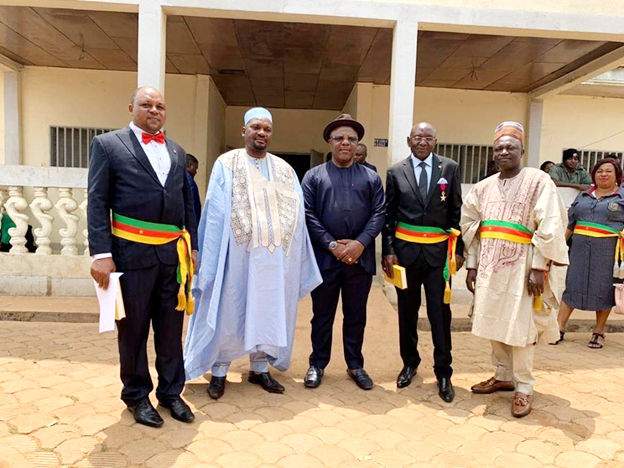(Buea-Cameroon)
The newly-elected Mayors of Alou, Wabane and Fontem Subdivisions in Lebialem Division, have been commissioned.
They were sworn-in by the judicial authorities in the Division, under the watchful eyes of the Senior Divisional Officer, William Mungambo Ekema.
The oath-taking exercise took place Monday, March 16, a ghost town day that has been set aside by Separatist fighters and widely respected in Anglophone Cameroon.
The ceremony instead took place at the Divisional Office of Alou, owing to the Anglophone Crisis, which led to the burning of the court premises in Menji, in 2018.
Sources in Lebialem Division told intimated that the event took place in Alou, and not in Menji, where it was supposed to take place, due to insecurity. The Mayor of Wabane, Israel Nembo Ketu, talking The Post Newspaper on phone, said the law permits the High Court to hold anywhere in the Division, adding that Alou was chosen because it is mid-way into the Division.
[myAds]
The Mayors were told to serve the people and not to be served, to strive for peace which will pave the way for development.
“We were told to do our work diligently, with honesty and in respect of the law,” Israel Nembo Ketu said.
The event was attended by the Minister Delegate to the Ministry of the Economy, Planning and Regional Development, Paul Tasong and Senator Lekunze.
A source in Lebialem, speaking to The Post said that the people were transported to the Division from Dschang, in Amoured Cars.
Lebialem is known as one of the Divisions in the Southwest Region where people fear to tread on, due to the presence of one of the dreaded Ambazonian warriors, ‘General Field Mashall’.
What The Post Witnessed In Lebialem
On February 25, 2020, The Post travelled to Lebialem to cover the election of the CPDM Mayor of Alou Subdivision.
We were driven in a military convoy from Fongo-Tongo, Menoa Division, West Region of Cameroon. On the way to the Subdivision, our reporter witnessed villages that have been deserted as a result of the Anglophone Crisis, which started in 2016 and later degenerated into an armed conflict in 2017.
Houses seen through the glass window of amoured cars were overgrown by grass.
[myAds]
Along the road, no soul life was seen. It appears that only military vehicles have been plying the road.
It looks like a complete warzone from where people have fled. Soldiers were communicating from one of their cars to another, using highly sophisticated technological devices.
At one moment, the vehicle would slow down or stop and wait for the one behind, in case there were attacks. We were told that it was a military tactic.
The topography of Lebialem is very hilly, dotted with mountains.
After about an hour, we got to the premises of the DO of Alou that looked like a military barrack.
No one was allowed out of the gate, for security reasons. Military men were stationed on high embankments, combat-ready with heavy artillery facing the bushes. Through the gate, one could see villages turned into bushes. We were told that those were areas that used to be booming with life and business.
A military man, however, said there are still some people left in the Subdivision, but one can hardly see them as they are far inside remote villages. The military man narrated that they (military) do have skirmishes sometimes, especially when touring other Subdivisions like Wabane and Fontem.
But throughout the journey, the presence of ‘General Field Marshall’ was not felt, as the convoy travelled unperturbed. This might be unbelievable to some social media activists who thought Lebialem was under the extreme control of ‘Field Marshall’.
The civilians that attended the event were all brought in as they are resident in the neighbouring Dschang or elsewhere, where there is safety (The Post issue No. 02075. The election of the Mayor lasted less than three hours and the people were hurriedly rushed back to Dschang, where celebrations took place.
First Published in The Post Newspaper, Cameroon.
[myAds]
